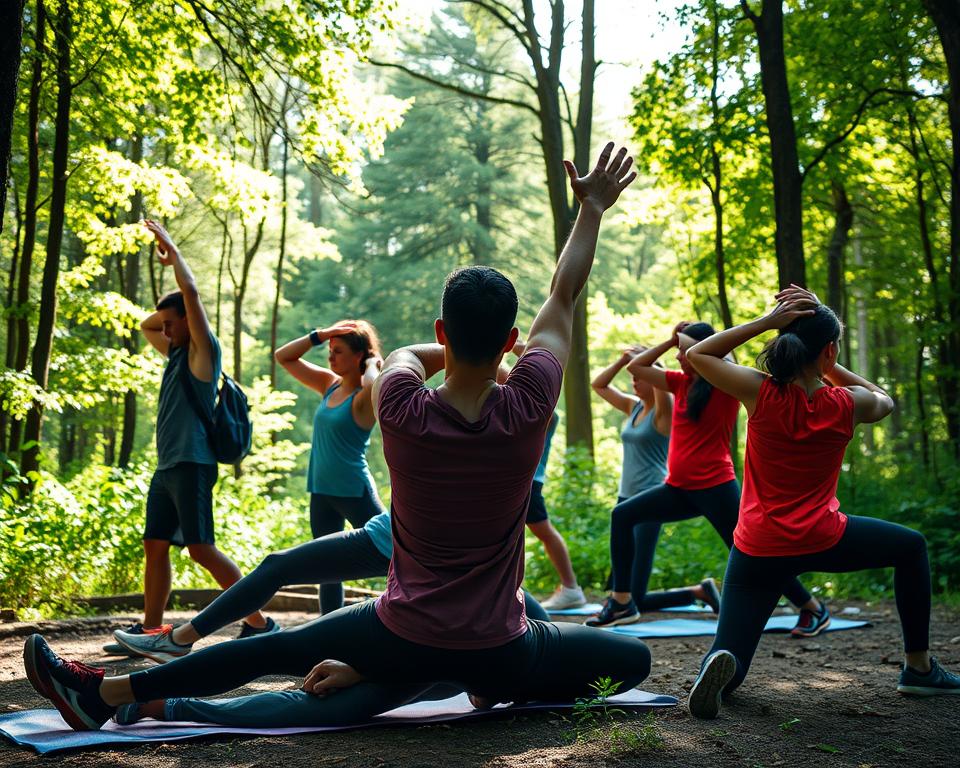Hiking through nature brings excitement but can also make you feel sore and tired. This soreness means your muscles are getting stronger. No matter if you’re a pro or a newbie, knowing how to recover after a hike is key to feeling better fast.
John Muir believed being in nature boosts your mind and creativity. But, the journey doesn’t stop once the hike ends. To beat post-hike tiredness, focus on muscle recovery. This involves stretching, eating right, and drinking plenty of water. Follow these steps to create a recovery routine that makes going back to daily life smoother.
Understanding Post-Hike Fatigue
Have you ever felt sore and tired after a challenging hike? This is common and shows your body needs to heal. When you tackle steep trails and hop over streams, your muscles work hard. This can lead to strain and a need for recovery.

Why Your Body Feels Sore
Feeling sore after a hike means your muscles are getting stronger. Climbing and scrambling cause small tears in muscle fibers. This leads to inflammation and stiffness, signaling healing and strengthening for next time.
Signs of Post-Hike Fatigue
Knowing post-hike fatigue signs helps in recovery. Look out for muscle pain, tiredness, and dehydration. Noticing these helps avoid more serious issues.
Deal with fatigue by staying hydrated, eating well, and resting. This supports your body in healing and getting ready for your next adventure.
Effective Stretching Techniques
After a long hike, your muscles might feel stiff and sore. Stretching for hikers is great for easing this stiffness. It also makes your muscles more relaxed and flexible. Let’s look at some stretches that can help you bounce back.
Heel Sits
The heel sits stretch is excellent for easing tension in your feet, ankles, and knees. To do this stretch, kneel and sit back on your heels. Keep this pose for about 30 seconds. You’ll feel the stretch in your lower legs. Do this a few times to get the best results.
Pigeon Stretch
The pigeon stretch is perfect for stiff hips. Start in a plank position. Then, bring one knee towards the wrist on the same side, lowering your hips to the ground. This targets the hip flexors and eases stiffness.
Hamstring Stretch
For tight thighs, try the hamstring stretch. Lie on your back and raise one leg up. Use your hands or a strap to hold it. The other leg can be bent or flat on the floor. Stay in this pose for 30 seconds. Make sure to switch legs. It helps with muscle relaxation and flexibility.

Adding these stretches after hiking helps with recovery. It also improves your hiking experience. Remember, being consistent is the key to better flexibility and relaxed muscles. Happy hiking!
How to Recover from a Long Hike
Hiking is great for your mind, body, and soul. But after a long hike, it’s important to recover properly. This helps your muscles relax and heal. By using the right recovery methods, you’ll be ready for another adventure soon.
Stretching is key after a hike. It reduces muscle soreness and keeps muscles flexible. Be sure to stretch softly to avoid injury. Besides stretching, deep breathing and meditation help lower inflammation and speed up muscle repair.
Eating the right foods is also vital for recovery. Your body needs proteins, complex carbs, and vitamins. Foods like fish, eggs, chickpeas, and green peas are good for muscle repair. Beans, whole grains, and veggies give you the energy you need.
Don’t skip on healthy fats. Foods like nuts, avocados, and flax seeds help with nutrient absorption and inflammation. Bananas are great for quick carbs and potassium, which help fix muscles. Turmeric, with its anti-inflammatory benefits, eases muscle and joint pain.
Drinking enough water is crucial too. Aim for at least eight cups a day to fight off dehydration. Eating fruits like watermelon and oranges helps keep your electrolytes in check.
Use these tips in your post-hike routine to relax muscles, lessen inflammation, and repair muscle damage. Next time you hike, these suggestions will help you recover quickly and effectively.
Nutrition to Speed Up Recovery
After a tough hike, it’s key to eat the right foods to recover well. Protein helps fix muscles. Try fish, eggs, chickpeas, and peanut butter for top-notch protein. Getting 15-25 grams of protein after your hike is best for muscle healing.
Eating complex carbs is also important for your health after hiking. Whole grains, sweet potatoes, and quinoa refill your energy stores. It’s smart to eat a mix of carbs and protein in a 3:1 ratio, like 60 grams of carbs and 20 grams of protein.
Fruits such as bananas, dates, and grapefruit give you natural sugars and key vitamins. These fruits help keep your energy up and support recovery.
Foods loaded with Vitamins C and E help you recover by fighting stress from exercise. Many fruits, veggies, and nuts have these helpful antioxidants.
Drinking enough water is also a must. For every pound you lose while hiking, drink 24 oz (720 mL) of fluids. Chocolate milk can be a good choice after hiking. It gives you fluids and the right carbs to protein balance.
Eating protein, carbs, and drinking plenty of water makes recovery better. This way, you’ll be set for your next outdoor adventure.
Hydration Tips for Optimal Recovery
After a long hike, it’s crucial to rehydrate for optimal recovery. Proper hydration is key to rejuvenating muscles and replenishing fluids. Drinking water post-hike helps reduce muscle fatigue and boosts recovery.
The Importance of Hydration
During long hikes, we sweat and lose a lot of fluid. Research shows that athletes can lose about one pound of sweat in a workout. To prevent dehydration, drink at least eight cups of water after your hike. Ensuring you get enough electrolytes is also important to avoid dehydration symptoms.
Hydrating Foods and Drinks
Water and electrolyte drinks aren’t the only ways to rehydrate. Eating fruits like watermelon, oranges, and pineapple is great for hydration and nutrition. Coconut water is another excellent choice due to its natural electrolytes. For muscle recovery, try Pedialyte Sport, which has five electrolytes and less sugar than many sports drinks.
To increase your hydration, try making cucumber water. Just add cucumber slices to water and let it sit for a few hours. This drink is not only refreshing but also helps cool you down after a hike.

